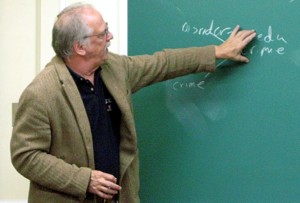
Peter Manning est professeur au College of Criminal Justice de l’Université Northeastern de Boston.
Il a publié en 2003 Policing Contingencies (University of Chicago Press).
Son dernier livre The Technology of Policing. Crime Mapping, Information Technology, and the Rationality of Crime Control vient d’être publié aux New York University Press en juin 2008.
Mardi 16 septembre 2008
11h45 à 13h00
Pavillon Lionel Groulx, 3150 rue Jean-Brillant, salle C-4141
Résumé de la conférence
Since 9.11 and before, a number of changes in policing have taken place and there is more recognition of these changes- these include international cooperative policing; transnational policing; meta-national policing (private security corporations and war making by contract); the elision of peace-making, war and policing; donor policing and the commoditization of policing ("selling cops"); awareness of the layering of policing (the police family); and the growth in law and agencies world-wide devoted to "border protection," deportation and surveillance, etc. Efforts have been made to examine the meanings of security, accountability, transparency and democratic policing. New forms of crime have emerged: cyber crime and technocrime have become new concerns nationally and internationally. The effects of these trends are as yet unknown. "It is too early to say" as Chairman Mao said about the French Revolution. The talk sets out a notion of democratic policing drawing on the ideas of John Rawls that provides a model for assessing and understanding "democratic policing" and its relation to democracy.
Attention - Votre version d'Internet Explorer est vieille de 21 ans et peut ne pas vous offrir une expérience optimale sur le site du CICC. Veuillez mettre à jour votre ordinateur pour une expérience optimale. Nous vous recommandons Firefox ou Chrome, ou encore ChromeFrame si vous êtes dans un environnement corporatif ou académique dans lequel vous ne pouvez pas mettre à jour Internet Explorer.